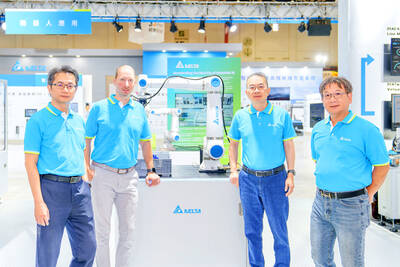Increased public awareness and understanding of the more secure integrated-circuit (IC) payment cards is deemed conducive to banking institutions' efforts to promote such card use and decrease fraud, credit-card giant Visa International said yesterday.
Sixty-five percent of Taiwanese people said they are very familiar with IC-embedded cards, putting the nation first among the Asia- Pacific region's nine markets in a recent survey conducted by Visa, said Marco Ma (
The survey interviewed a total of 1,800 people in markets including Taiwan, Hong Kong, Japan and Australia in the first quarter of the year to understand consumers' interest, usage and expectations toward the latest payment tools.
The tiny IC chip embedded on ATM, credit or transportation cards functions like a mini computer with cardholders' transaction information recorded to enhance applications, such as the inclusion of bonus-point programs that offer cash rebates when purchases are made.
In Taiwan, IC chips have been put on bank cards, credit cards, debit cards, retailers' value-added cards and the EasyCards used in Taipei's mass rapid transit system.
About 52 percent of the nation's consumers reported they have used chip cards. Among them, over 50 percent said department stores are the venue where they used such cards the most, followed by the transportation system and supermarkets, the survey found.
"The survey results have proven that our year-long promotional efforts in cooperation with the Taiwanese government has born fruit," Ma said. "Now what we should do is provide more incentives to encourage cardholders to use or transfer to IC cards."
While 54 percent of the consumers said security as the biggest feature provided by IC cards, only 40 percent of respondents thought the cards would make purchasing more convenient and 20 percent said they were multi-functional.
Visa has issued nearly 4 million chip cards in Taiwan and installed more than 139,000 chip-card readers. It expects to replace the remaining older card readers by the end of the year in order to accommodate chip cards, Ma said.

SETBACK: Apple’s India iPhone push has been disrupted after Foxconn recalled hundreds of Chinese engineers, amid Beijing’s attempts to curb tech transfers Apple Inc assembly partner Hon Hai Precision Industry Co (鴻海精密), also known internationally as Foxconn Technology Group (富士康科技集團), has recalled about 300 Chinese engineers from a factory in India, the latest setback for the iPhone maker’s push to rapidly expand in the country. The extraction of Chinese workers from the factory of Yuzhan Technology (India) Private Ltd, a Hon Hai component unit, in southern Tamil Nadu state, is the second such move in a few months. The company has started flying in Taiwanese engineers to replace staff leaving, people familiar with the matter said, asking not to be named, as the

The prices of gasoline and diesel at domestic fuel stations are to rise NT$0.1 and NT$0.4 per liter this week respectively, after international crude oil prices rose last week, CPC Corp, Taiwan (台灣中油) and Formosa Petrochemical Corp (台塑石化) announced yesterday. Effective today, gasoline prices at CPC and Formosa stations are to rise to NT$27.3, NT$28.8 and NT$30.8 per liter for 92, 95 and 98-octane unleaded gasoline respectively, the companies said in separate statements. The price of premium diesel is to rise to NT$26.2 per liter at CPC stations and NT$26 at Formosa pumps, they said. The announcements came after international crude oil prices

STABLE DEMAND: Delta supplies US clients in the aerospace, defense and machinery segments, and expects second-half sales to be similar to the first half Delta Electronics Inc (台達電) expects its US automation business to remain steady in the second half, with no signs of weakening client demand. With demand from US clients remaining solid, its performance in the second half is expected to be similar to that of the first half, Andy Liu (劉佳容), general manager of the company’s industrial automation business group, said on the sidelines of the Taiwan Automation Intelligence and Robot Show in Taipei on Wednesday. The company earlier reported that revenue from its automation business grew 7 percent year-on-year to NT$27.22 billion (US$889.98 million) in the first half, accounting for 11 percent

A German company is putting used electric vehicle batteries to new use by stacking them into fridge-size units that homes and businesses can use to store their excess solar and wind energy. This week, the company Voltfang — which means “catching volts” — opened its first industrial site in Aachen, Germany, near the Belgian and Dutch borders. With about 100 staff, Voltfang says it is the biggest facility of its kind in Europe in the budding sector of refurbishing lithium-ion batteries. Its CEO David Oudsandji hopes it would help Europe’s biggest economy ween itself off fossil fuels and increasingly rely on climate-friendly renewables. While